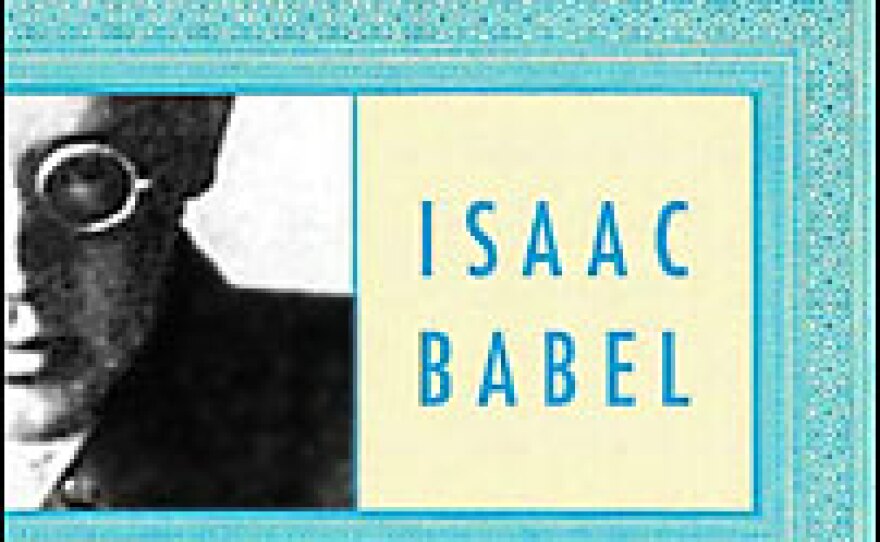
Call them buttonhole books, the ones you urge passionately on friends, colleagues and passersby. All readers have them -- and so do writers. This summer, NPR.org talks with authors about their favorite buttonhole books in the weekly series "You Must Read This."
George Saunders is a satirist who pursues the hyper-marketed character of American life to its most deranged extremes. So it's perhaps not surprising that Saunders is a fan of the short fiction of Isaac Babel, which charted the very different but no less absurdist perils of life in the Jewish shtetl and among revolutionary Cossack armies in the Russia of the early 20th century.
Q: How did you first encounter Babel's work?
A: I first read Babel in a class Tobias Wolff was teaching on the short-story collection. I think what impressed me was the way Babel could be both minimalist and maximalist at once. I'd just come back from working in the oilfields in Asia and was looking for a way to write about that experience. I was a big Hemingway fiend but somehow that approach wasn't working for the Asian material. ("Nick went into the McDonald's on Orchard Road, where all the transvestites would gather. He ordered a Big Mac. It was pleasant.") Of course, ultimately, the Babel approach didn't work either. ("Nikolai approached the McDonald's on Orchard Road, the sun looming like a lopped-off head, the transvestites with their sponge-like fingers sitting at the little tables like…like…like sponge-fingered transvestites.") But it was interesting to see how prose could be simultaneously lush and sparse.
At that time, the New Realism was very much in the air, and often that meant -- in the hands of the legions of young Carver-imitators, including me – a kind of purposeful flatness in the prose, an attempt to make the prose vanish. And Babel seemed to represent the opposite of that, while preserving the virtues of minimalism: speed, certainty, narrative shapeliness.
Q: Did that translate into any changes in your writing or how you thought about fiction?
A: In my reading of him, there's this sense of two types of beauty crossing in Babel's prose: the beauty of the world, and the beauty of the sentence. The reader feels dazzled by the intelligence compressed into so few words, and then makes that extra effort of visualizing the described thing. I don't think he's trying to be accurate, as such. He's trying to create an impression in the mind. That was refreshing to me as a writer. I'm not much good at physical description. I kind of draw a blank when I try to think of, say, a novel way of describing a tree. But I feel a little more confident if the charge is: Write an unusual sentence with a tree in it.
Q: What do you think informs Babel's comfort with -- some would say idealization of -- the casual brutality of the Cossacks and the pogroms of his youth?
A: I expect it has to do with his childhood: growing up a thoughtful, intellectual kid in a world (Odessa, circa early 1900s) that was rough and full of violence. So one way a person might bridge this gap is to write about violence in a casual way. (Or it might be more the case that he was on the outside of that violence, looking at it, afraid and fascinated). And apparently he had, all his life, this fascination with violence -- starting with his trip into Poland with the Cossacks and, some say, ending with his arrest, which may or may not have been related to his friendship with high-ranking members of the secret police and/or an affair with one of their wives.
In my case, I grew up in Chicago and there was a lot of fist-fighting and petty brutality around the neighborhood, and, I would say, a disregard for braininess. So a person inclined towards thinking might find himself trying to accommodate these two competing world views. When a person has seen this way of living up close, it becomes central to who you are. You can deny it, you can embrace it, but there it is, you know? And I get that feeling with Babel.
Also, of course, there is great drama in violence, and in a certain sense, all literature is about the grotesque. Or, let's say, about the unusual – nobody wants to know about what happened the day Little Red Riding Hood missed seeing The Wolf.
Copyright 2023 NPR. To see more, visit https://www.npr.org. 9(MDM3NjYwMjA5MDE1MjA1MzQ1NDk1N2ZmZQ004))


